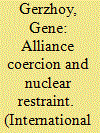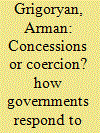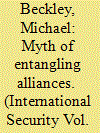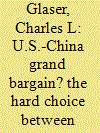| Srl | Item |
| 1 |
ID:
138170


|
|
|
|
|
| Summary/Abstract |
A prominent model of nuclear proliferation posits that a powerful patron state can prevent a weaker ally from proliferating by providing it with security guarantees. The history of West Germany's pursuit of the bomb from 1954 to 1969 suggests that a patron may also need to threaten the client state with military abandonment to convince it not to acquire nuclear weapons.
|
|
|
|
|
|
|
|
|
|
|
|
|
|
|
|
| 2 |
ID:
138172


|
|
|
|
|
| Summary/Abstract |
When do newly independent states employ coercive measures against restive ethnic minorities within their borders rather than offer them concessions? The more vulnerable a state is to a particular minority’s bid for secession, the more likely it is to use coercion against that minority.
|
|
|
|
|
|
|
|
|
|
|
|
|
|
|
|
| 3 |
ID:
138168


|
|
|
|
|
| Summary/Abstract |
For the first 165 years of its history, the United States did not form any alliances besides the one it signed with France during the Revolutionary War. Instead, U.S. leaders followed George Washington’s advice to “steer clear of permanent alliance with any portion of the foreign world, a recommendation subsequently enshrined in Thomas Jefferson’s inaugural pledge: “Peace, commerce, and honest friendship with all nations; entangling alliances with none.”
|
|
|
|
|
|
|
|
|
|
|
|
|
|
|
|
| 4 |
ID:
138171


|
|
|
|
|
| Summary/Abstract |
To what extent do domestic politics influence the United States’ policy toward Israel? Documentary evidence demonstrates that although President Gerald Ford and Secretary of State Henry Kissinger initially sought a comprehensive Arab-Israeli peace agreement, domestic considerations played a key role in their decision to return to the step-by-step diplomacy favored by Israel’s supporters in the United Sates.
|
|
|
|
|
|
|
|
|
|
|
|
|
|
|
|
| 5 |
ID:
138169


|
|
|
|
|
| Summary/Abstract |
China’s growing military power has fueled a security competition with the United States, increasing the risk of war between the two countries. To reduce this likelihood, the United States and China should negotiate a grand bargain in which the United States ends its commitment to defend Taiwan, and China agrees to resolve its maritime territorial disputes peacefully and accepts the United States’ long-term military presence in East Asia.
|
|
|
|
|
|
|
|
|
|
|
|
|
|
|
|